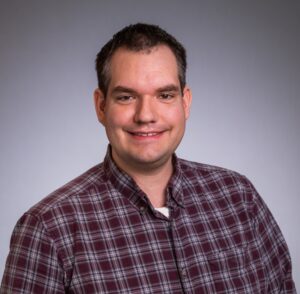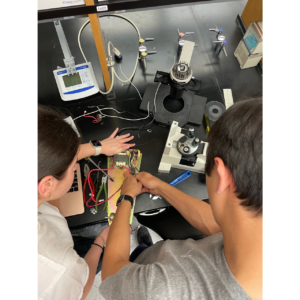Ben Bratton Faculty Profile
Benjamin Bratton is a new assistant professor at VUMC in the pathology, microbiology, and immunology department. He studies single cell microbial biology.

“I’m really excited about how bacteria thrive. Most people want to kill the bacteria, but I want to know why they don’t die,” he explained.
“Bacteria grow so fast they’re a great place to look at evolution because you have clonal populations that can then vary on a reasonable timescale.” he said. “I am interested in single cell responses and how to measure the fitness and health physiology of single bacterial cells as opposed to populations. I am also interested in populations of single celled organisms and how they deal with waste degradation and resource sharing. I want to help people develop the tools to look at cellular level physiology.”
He joined the university in the summer of 2021 after completing a postdoctoral position at Princeton University. Bratton was advised by both Josh Shaevitz focused on genomics and physics and Zemer Gitai in molecular biology.
In Bratton’s words, “postdoctoral positions in our field are generally two short ones or one long one. I was able to find two advisors at the same location doing complimentary things and that worked out really well for me.”
Before his postdoctoral position, he earned a Ph.D. in chemistry under Jim Weisshaar at the University of Wisconsin – Madison. He earned his Bachelor of Science degree at Wheaton College in Illinois.

“In my first year of college, I was trying to decide if I wanted to be a mathematician or a biophysicist. I was in the chemistry department taking a class that had a statistical mechanics lecture when I first realized I could do biophysics without giving up math. I knew then that this research is where I want to be,” Bratton said.
He continued, “I asked around the department to see if anyone was taking research students. It turned out that the bacteriologist – who was also the microbiologist – was looking for summer help. My advisor told me we can do some PCR and grow bacteria and within 72 hours I was up to speed on the lab’s research and able to help out in a meaningful way. That’s when I learned microbiology is fantastic!”
He uses that early college experience to help guide his mentoring at Vanderbilt. This past year, Bratton came in and spoke to assistant professor of biological sciences Megan Behringer’s undergraduate special topics course. After the class, Aaron Yeh sought out Bratton and spoke to him about joining the lab.
“Aaron is an undergraduate researcher that is really excited to get some lab experience. Part of his work will be exploratory and just figuring out what he does and doesn’t like about cellular biology. He hopes his experience in the lab will help him pick between a couple of career paths, specifically an infectious disease pediatrician or a basic science researcher,” Bratton explained.

Other mentees have also benefited from his machine learning and data science skills.
According to assistant professor of Microbiology and Molecular Genetics at Oklahoma State University, Randy Morgenstein, “Dr. Bratton taught me basic Matlab skills that have not only transformed my ability to analyze data but have taught me the possibilities of how data can be analyzed. This has helped to advance my research to unknown possibilities.”
According to Diana Mendez, a Ph.D. candidate in physics at Princeton, “one of the most exciting things about using machine learning and data science in microscopy is the invaluable insight that we get about how life works. With these quantitative observations we can write models and test hypotheses that otherwise would be impossible to tackle. One of the coolest things I learned under Dr. Bratton is the value of a good 3D visualization and how impactful an animation can be in getting your point across. Dr. Bratton is one of the most knowledgeable people I’ve met and working with him was an incredible experience!”
Bratton’s trainees have already taken on mentoring in their own right, attributing some of their success to their previous mentor.
“Learning how to build, program and use a microscope was something I did not believe I was capable of beforehand. Under Ben’s tutelage I learned all those things and am now capable of helping others in my postdoc lab,” said Robert Scheffler, PhD, now a Postdoctoral Research Associate at the Carnegie Institution of Science.
Budding scientists are not the only ones that can have fun doing microbiology, though.
Bratton explained, “One of the things that really appeals to me about using bacteria as a model system is that it is really easy to integrate contemporary research with educational and outreach components. It’s really easy for people at home to swab their face and culture it and see that there’s different colony morphologies. Making that into research quality work is a step up, but it’s a really nice starting point.”
This past fall, Bratton and Behringer were awarded a pilot grant from the Evolutionary Studies Initiative to study the evolution of E. coli. Read more here.

